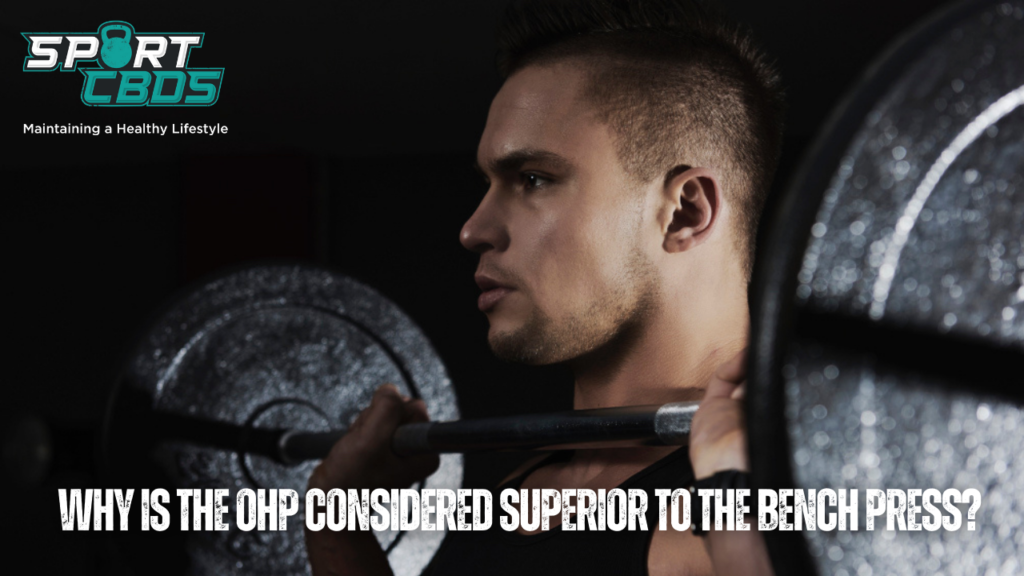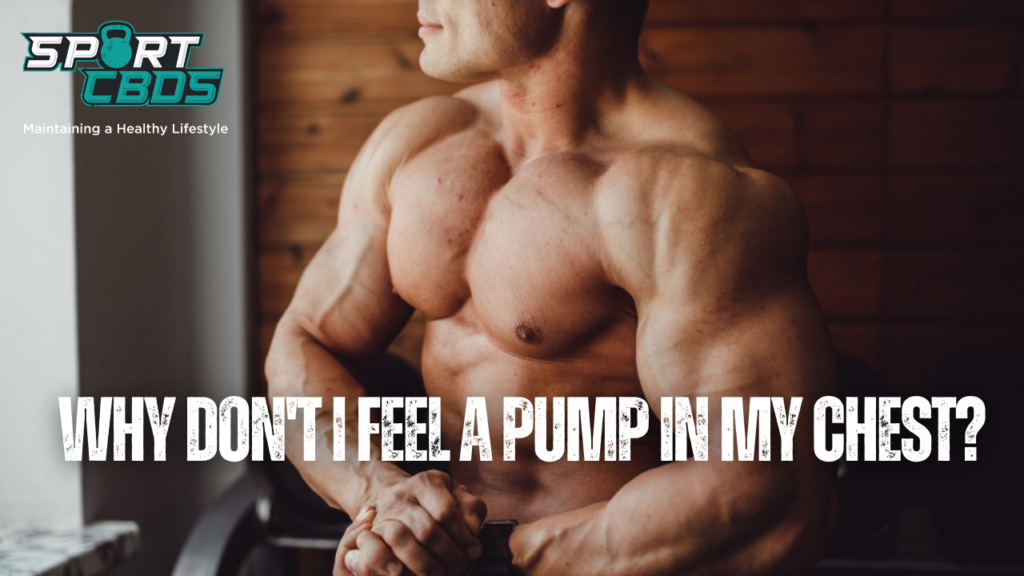
Why Is The OHP Considered Superior To The Bench Press? Find Out Here
In the world of strength training, there’s a never-ending debate about which exercises reign supreme. Today, we’re putting the spotlight on two popular upper body exercises that often find themselves at the center of this debate: the Overhead Press (OHP) and the Bench Press.
While both have their dedicated fan base and undeniable benefits, many fitness enthusiasts and experts consider the OHP to be the superior choice. In this blog post, we’ll explore the reasons behind this belief by comparing the OHP and the Bench Press, discussing the advantages and unique qualities of each exercise.
So, whether you’re a seasoned gym-goer or just starting your fitness journey, buckle up and join us as we dive deep into the fascinating world of OHP and Bench Press superiority!
Why is the OHP Considered Superior to the Bench Press?
The Overhead Press (OHP) is often considered superior to the Bench Press for several compelling reasons. First and foremost, the OHP provides greater functional strength and real-world application. Unlike the Bench Press, which simulates a less common movement of lying on your back and pushing weight away from your chest, the OHP mimics everyday actions such as lifting objects overhead or pushing things away from your body. This makes it a more practical exercise for overall strength development. Furthermore, the OHP engages a wider range of muscle groups, recruiting not only the shoulders and chest but also the triceps, upper back, and core muscles, resulting in a more comprehensive workout. Another advantage of the OHP is its positive impact on shoulder health and stability. By promoting a more natural range of motion and proper scapular rotation, the OHP helps prevent common shoulder injuries, whereas the Bench Press can put excessive stress on the shoulder joint over time. In addition, the OHP aids in posture and core development, as it requires maintaining an upright stance and engaging the core muscles for stabilization. Finally, the OHP boasts an impressive array of variations that cater to different training goals and preferences, offering greater versatility compared to the Bench Press. While the Bench Press undoubtedly has its merits, it’s the unique combination of these factors that solidify the OHP’s superiority in the eyes of many fitness enthusiasts and experts alike.
1. Functional Strength and Real-World Application
To fully grasp the superiority of the OHP, it’s essential to delve into the concept of functional strength. Functional strength encompasses the type of strength that directly translates to real-world scenarios, such as effortlessly lifting objects overhead or exerting force to push objects away from your body.
In terms of functional strength, the OHP holds a clear advantage over the Bench Press. The OHP closely replicates movements we commonly perform in our daily lives, including actions like hoisting a heavy box onto a high shelf or exerting force to push open a stubborn door. In contrast, the Bench Press emulates a less frequently encountered movement—lying on your back and pushing weight away from your chest. This type of motion is not typically experienced in everyday life, making the OHP a more practical and applicable exercise for overall strength development.
2. Engaging More Muscle Groups
One of the significant advantages of the OHP lies in its ability to activate a broader range of muscle groups. Although both exercises predominantly target the shoulders and chest, the OHP takes it a step further by incorporating additional muscles and stabilizers into the mix.
For example, the OHP not only strengthens your triceps and upper back, but it also engages your core muscles as you stabilize the weight overhead. In contrast, the Bench Press mainly concentrates on the chest, shoulders, and triceps. By involving a more diverse array of muscle groups, the OHP delivers a comprehensive workout experience, resulting in superior muscle development and overall conditioning.

3. Shoulder Health and Stability
Maintaining shoulder health and stability is a critical aspect of any upper body workout. The OHP is often championed for its superior impact on shoulder health compared to the Bench Press. This advantage stems from the OHP’s promotion of a more natural range of motion for the shoulder joint, contrasting with the somewhat limited movement offered by the Bench Press.
During the OHP, your shoulders experience a motion that enables proper scapular rotation and engagement of the rotator cuff muscles. This dynamic helps to prevent common shoulder injuries and fosters better overall shoulder health. Conversely, the Bench Press can place excessive stress on the shoulder joint, potentially leading to injuries over time, especially when executed with improper form.
4. Posture and Core Development
Posture and core development play crucial roles in promoting overall health and fitness. The OHP positively influences both of these aspects, further reinforcing its superiority over the Bench Press in terms of delivering a well-rounded workout experience.
When executing the OHP, you’re required to maintain an upright posture while actively engaging your core muscles to stabilize the weight overhead. This combination not only helps to develop a stronger core, but it also contributes to improved posture. Enhanced core strength and proper posture are vital for preventing injuries, ensuring a stable foundation for other exercises, and elevating overall fitness levels.
On the other hand, while the Bench Press remains an effective exercise for building chest and arm strength, it doesn’t provide the same level of benefits in terms of posture and core development. Since the exercise is performed lying down, your core and postural muscles aren’t as actively engaged, resulting in more limited gains in these areas compared to the comprehensive benefits offered by the OHP.
Related: Is Arnold Press Better Than Shoulder Press?
5. Versatility and Variations
Another aspect that sets the OHP apart from the Bench Press is its impressive versatility and the myriad of variations it offers to cater to different training goals and preferences. From the traditional standing barbell press to the seated dumbbell press, kettlebell press, and even the landmine press, the OHP provides a diverse range of options to keep your workouts fresh, engaging, and challenging.
While the Bench Press does feature its own variations, such as incline, decline, and close-grip presses, the selection isn’t as extensive as that of the OHP. What’s more, OHP variations often activate a broader range of muscle groups and deliver a more dynamic workout experience. This added versatility and adaptability further solidify the OHP’s superiority over the Bench Press, allowing for greater customisation and accommodating a wide array of fitness goals.
6. The Case for the Bench Press
While we’ve highlighted the various advantages of the OHP, it’s essential to recognize that the Bench Press possesses its own merits, which shouldn’t be overlooked. Renowned for effectively targeting chest muscles, the Bench Press has long been a cornerstone in powerlifting and bodybuilding routines. Furthermore, it’s an excellent movement for building upper body strength and muscle mass, particularly when focusing on the pectoral muscles.
It’s crucial to remember that both exercises offer unique benefits and should be incorporated into a comprehensive workout routine. The key lies in achieving a balance between the two, factoring in your specific training goals and requirements. By combining the strengths of both the OHP and the Bench Press, you can optimize your workouts, ensuring a well-rounded approach to building muscle and increasing overall strength.

FAQs
How strong should OHP be compared to bench?
While individual strength ratios can vary, a general rule of thumb is that your OHP should be around 60-70% of your Bench Press weight. Factors such as personal muscle imbalances, training history, and genetics can influence this ratio. As you progress, it’s essential to track your strength in both exercises to ensure balanced upper body development.
Is OHP harder than bench press?
Some people may find the OHP more challenging than the Bench Press due to the increased number of muscle groups engaged, the need for greater core stability, and the importance of maintaining proper form. However, difficulty is subjective and can depend on individual strengths, weaknesses, and training history.
Why is the overhead press considered the best?
The OHP is often considered the best because it provides functional strength, engages a wider range of muscle groups, promotes shoulder health and stability, improves posture and core development, and offers versatility with numerous variations. These factors contribute to the OHP’s reputation as a superior exercise for overall upper body strength and conditioning.
Does OHP translate to bench?
Yes, the OHP can have a positive impact on your Bench Press performance. The OHP strengthens your shoulders, triceps, and upper back, which are all essential muscles for the Bench Press. By improving your OHP, you’re likely to see an increase in your Bench Press strength over time.
Is the overhead press the best lift?
While the OHP is an excellent lift for various reasons, it’s essential to recognize that a well-rounded workout routine should include a range of exercises targeting different muscle groups. The OHP may be considered one of the best lifts for upper body strength and functionality, but incorporating other exercises like the Bench Press, squats, and deadlifts will ensure balanced muscle development and overall fitness.
Related: Does Shoulder Press Work Front Deltoids?
Final thoughts…
The Overhead Press (OHP) is often considered superior to the Bench Press for several reasons. The OHP offers greater functional strength and real-world application, engages more muscle groups, promotes better shoulder health and stability, improves posture and core development, and provides more versatility with its numerous variations.
While the Bench Press is an effective exercise for building chest strength and muscle mass, it’s essential to recognize the unique advantages of the OHP when prioritizing your workouts. By incorporating both exercises into your routine, you can reap the benefits of each and work towards a stronger, healthier, and more balanced physique. So why not give the OHP a try and experience the difference for yourself?
Do you think the OHP is superior to bench press and have these tips helped? Let me know in the comments section below.
If you enjoy sports and use CBD to help with your recovery in between gruelling workouts, then you are in the right place. Here at Sport CBDs, we train hard and recover the best way possible…
We have regular workouts (check out the YouTube channel), CBD news and CBD products to help you gain that edge!
If you wanted to check out the reputable CBD we have on offer here at the site, then please head to the Sport CBDs Store (CLICK HERE). We also do fitness clothing and yoga accessories too.
Until next time, all the best…
Lee
Founder – Sport CBDs
Featured Image Attribution – Image by gpointstudio on Freepik


